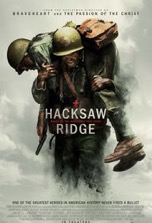Hacksaw Ridge (R)
27/03/17 02:03 Filed in: 2016

Starring: Andrew Garfield
November 2016
What follows is the full-length review based on comments that were originally tweeted in Real-time from the back row of a movie theater @BackRoweReviews. Though efforts were made to tease rather than ruin this movie’s memorable lines and moments, some spoilers may exist in the following evaluation. For concerns over objectionable content, please first refer to one of the many parental movie guide websites. Ratings are based on a four star system. Happy reading!
There are a number of similarities between Mel Gibson’s new World War II story, Hacksaw Ridge and the WWI set Sergeant York (1941). Hacksaw’s Desmond Doss (Andrew Garfield) and York’s Alvin C. York (Gary Cooper) are both devout Christians and conscientious objectors. Due to the sixth commandment in the Bible, both men object to war since war is killing. Both men face heat for their beliefs from their families, friends, fellow soldiers and commanding officers. However, the persecution is much more severe for Doss, who is berated and beaten by the men in his barracks for his refusal to bear arms. Ultimately, both men join the service, but for completely different reasons: Doss, who wants to heal people rather than kill them, becomes a medic while York, an expert marksman known for blasting his initials in trees and winning a local turkey shooting contest, decides to use his skills to protect the lives of his loved ones and to defend American freedom. The heroic actions of both men defy the conventions of reality and are two of the more inspirational stories in the annals of war. And both stories have been adapted into top-tier films. Hacksaw’s narrative is divided into thirds: the early stages are dedicated to Doss’s boyhood, where he roughhouses with his brother and is raised by a long-suffering mother, Bertha Doss (Rachel Griffiths), and ex-soldier alcoholic father, Tom Doss (Hugo Weaving), and his late teen years when he meets and marries Dorothy Schutte (Teresa Palmer). The middle of the film deals with the adversity Doss faces at boot camp and the ensuing court martial. The movie’s concluding chapters focus on Doss’s exploits in the war, specifically the Battle of Okinawa in 1945, one of the bloodiest struggles of WWII. During lulls in the action, Doss crawled over the corpse-riddled battlefield searching for survivors while evading Japanese patrols whose objective it was to kill any American soldiers still clinging to life. Doss devised an ingenious way of lowering casualties down the side of a cliff to safety—easily the most awe-inspiring, heart-stopping sequences in the film. In the end, Doss saved 75 lives without firing a single shot at the enemy. As such, Doss was the first ever non-combatant soldier to receive the Medal of Honor. Garfield is pitch-perfect in his portrayal of Doss; his flat affect and aw-shucks demeanor hasn’t been a natural fit for many of his roles, i.e., The Amazing Spider-Man films, but works wonders here. Weaving, best known for his roles in The Matrix and The Lord of the Rings films, paints a tragic portrait of a once-heroic man now controlled and triggered by the bottle. Vince Vaughn is a laugh-a-minute drill sergeant who injects some much needed comic relief into the story to counterbalance the movie’s horrific and grisly scenes. Griffiths is effective in an ancillary role and Palmer is delightful as the sweetheart nurse who first inspires Doss to become a healer. Sam Worthington plays one of Doss’ superior officers, Captain Jack Glover, a man who initially distrusts Doss but comes around when Doss heroically sacrifices himself for his squad mates. The biggest name in the film, of course, is director Mel Gibson. Gibson’s anti-Semitic remarks and longstanding troubles with alcohol have kept him on the outs with Hollywood for the better part of a decade now. Tom Doss’ character reflects some of Gibson’s struggles, so you can tell that this project was personal for the director. Those who are turned off by the non-stop action of the typical war film will find plenty of character scenes to offset the onslaught of action in the latter stages of the film. At its core, this is an anti-war war film. Hacksaw boasts fine performances, tremendous production values and an incredible true story. Just as Doss’ acts of valor redeemed him in the eyes of his fellow soldiers, hopefully Gibson’s efforts here will help him to regain a measure of respect from his Hollywood peers. We’ll see come awards season.